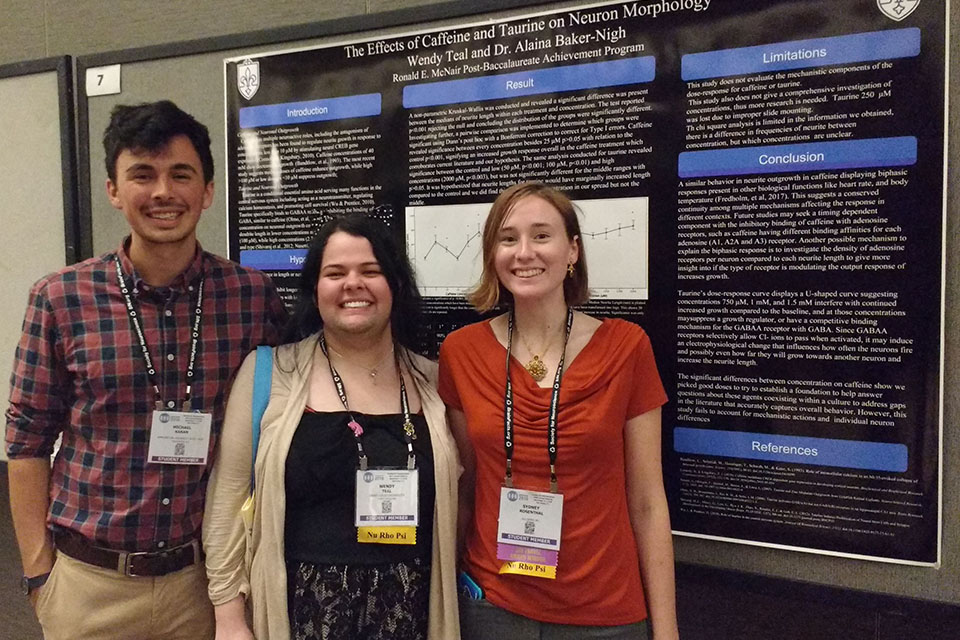Research Opportunities
Numerous research opportunities are available for Saint Louis University students in the neuroscience program. The Institute for Translational Neuroscience at SLU includes faculty from a wide range of neuroscience disciplines, many of whom include undergraduates in their research.
The Institute for Translational Neuroscience comprises 61 members and 18 associate members across six schools/colleges in 27 Saint Louis University departments, institutes and centers. The institute fosters multi-disciplinary neuroscience research ranging from molecular to clinical studies and promotes excellence in undergraduate and graduate neuroscience education.
Faculty Research
In addition to the Institute for Translational Neuroscience, students have participated in research projects in departments such as psychology and biology. Students interested in participating in these research opportunities are encouraged to contact the faculty member overseeing the project.
Please contact neuroscience@slu.edu if you have questions. Graduating seniors may want to look into post-baccalaureate programs.
Neuroscience Research Labs
Both undergraduates and graduates can pursue the research they find most interesting through faculty-guided research in one of the program's many research labs.
Cognitive and Affective Neuroscience of Aging (CANA) Lab
Principal Investigator: Jill D. Waring, Ph.D.
The Cognitive and Affective Neuroscience of Aging Lab investigates the interactions of cognition and emotion processing across the lifespan, with the goal of identifying behavioral and neural markers that may influence or precede cognitive decline or symptoms of anxiety and depression in late life. We investigate these topics using behavioral, neuropsychological and neuroimaging techniques.
Cognitive Neuroscience of Stress Lab
Principal Investigator: Tony W. Buchanan, Ph.D.
The Cognitive Neuroscience of Stress Lab is interested in how psychological stress affects attention, encoding, consolidation and retrieval of memory. We use endocrine measures (cortisol), autonomic nervous system activity (heart rate variability, skin conductance, pupil diameter) and eye-tracking methodology to examine how stress affects cognition.
Luking Lab
Principal Investigator: Katherine Luking, Ph.D.
Our research focuses on relationships between neurodevelopment and the emergence of psychopathology in middle childhood and early adolescence. Using a variety of methods (EEG, fMRI, behavior, hormones), we ask how core affective and cognitive processes, including emotion reactivity/regulation, response to social feedback, and reward processing, change in early puberty and mechanistically contribute to the emergence of depression and borderline personality disorder.
Ogilvie Lab
Principle Investigator: Judith Ogilvie
The Ogilvie lab takes a multidisciplinary approach to better understand the structure, development and degeneration of the vertebrate retina with two major areas of focus. Investigations of primate retinal circuitry use connectomics methodology to address fundamental questions of how the neuronal cell types in the retina enable us to interpret the complex visual world around us. Other research efforts focus on understanding the molecular cascade of events required for the development and differentiation of healthy retinal neurons and unraveling how defects in this cascade can lead to blindness.
Sengupta Lab
Principle Investigator: Mohini Sengupta
Generating movement is essential for survival. Even simple movements like walking require precise coordination between different body parts that is not a trivial feat. Just like toddlers slowly get better at walking, motor coordination improves as the animal matures. Motor coordination is specifically disrupted in several motor diseases and spinal cord injuries, yet therapy remains limited. Our lab is interested in deciphering how different muscles are coordinated for diverse movements, how this coordination is refined over development and how this coordination is disrupted in motor diseases.
